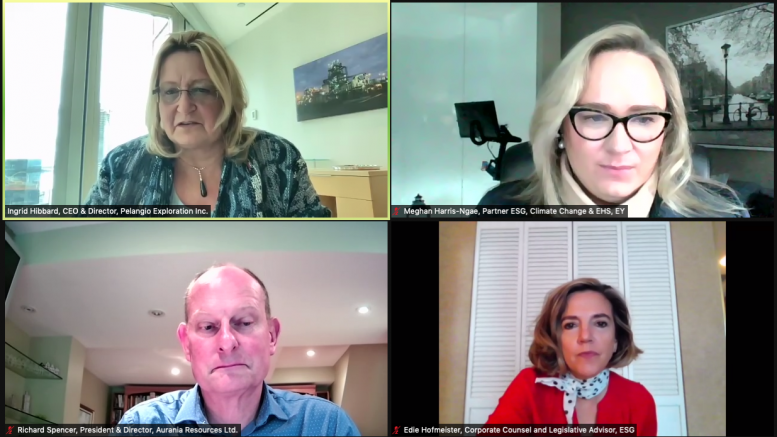Companies are facing increasingly complex reporting procedures for environmental, social and governance and preparing and publishing reports on ESG in an industry-compliant manner can be difficult, especially for juniors with limited resources, according to a panel discussion at the Northern Miner’s recent Global Mining Symposium on September 23.
Meghan Harris-Ngae, a partner at EY, kicked off the discussion with a warning that climate change-related issues are having a major impact on ESG.
“If we talk about what’s coming just from a regulatory perspective globally, climate change is the area where we’re starting to see more and more standardization,” said Harris-Ngae, adding that there’s a framework called the Task Force for Climate-Related Financial Disclosures (TCFD), and disclosure in line with those recommendations has now become mandatory in the United Kingdom.
The TCFD framework was created in 2015 by the Financial Stability Board, an international body that monitors and makes recommendations about the global financial system, she noted, with the goal being to develop consistent climate-related financial risk disclosures for stakeholders. Now other regulators, such as the U.S. Securities and Exchange Commission (SEC), are reviewing financial filings and starting to ask their own questions around climate risk, Harris-Ngae said.
“What we’re starting to see in North America is that the SEC, for example, has issued guidance on climate risk disclosure,” she said. “And we expect that there will be more guidance and requirements issued by the SEC in terms of what needs to be disclosed in financial filings related to climate change risk.”
As security regulators and accounting bodies in Canada and other jurisdictions take a closer look at climate-related financial risk disclosures, companies will need to make it a major focus as they address their ESG reporting, she said.
“I would say that’s the biggest impact, [in] trying to determine where to start, where to focus,” Harris-Ngae said. “In mining, focusing on climate risk would be the area to start because it is considered to be the one of the most material issues in the ESG space.”
Panel moderator Ingrid Hibbard, the president and CEO of junior Pelangio Exploration, pointed out that another issue for smaller companies is balancing field work searching for new discoveries with developing ESG. Fellow panelist Richard Spencer, president of Aurania Resources, agreed that this creates its own unique problems for explorers.
“Disclosure is actually the last thing that we think about,” Spencer said. “I mean, what we are trying to do is create value for our shareholders. We are trying to make the discoveries of significant deposits, which means that we’re interacting with people right from the outset. Each geologist that has boots on the ground … he or she is the person that’s carrying the flag for not only the company, but for the industry.”
For Spencer, this is where software solutions created to help resource companies complete their reporting in an industry-compliant manner becomes helpful. This is especially true when a junior seeks to both advance its exploration projects and simultaneously navigate what he calls the minefield that can be involved with developing ESG.
That minefield is only getting more complicated, according to Edie Hofmeister, a corporate counsel and legislative advisor on ESG. She provided a brief history of ESG’s ever-changing landscape, pointing out that at the start of the millennium there were only about ten relevant standards or laws that related to ESG issues.
“Fast forward twenty years and in 2020 we have dozens and dozens, if not hundreds, and many of which are becoming mandatory,” Hofmeister said. “So, I think for this group, you know, that the big ones that we’re seeing in Canada in terms of mandatory disclosure and vigilance are more in the way of case law.”
Hofmeister noted that there are legislative changes beyond just disclosure, and highlighted human rights issues such as the modern slavery acts, which have been implemented in various countries and which she believes will be passed in Canada sometime next year.
EY’s Harris-Ngae pointed out that the need to be aware of constantly evolving ESG standards and maintaining transparency has sometimes led to ‘ESG-washing’ – a trend similar to ‘greenwashing’ – where companies emphasize how environmentally sound their practices are, when, in fact, the opposite may be true.
“Essentially [it] means that you put out a statement or statements of what you’re doing from an environmental perspective. But those statements that you’re making may not be true, or you can’t actually prove that they are true, or they’re being put out for reputational gain,” she said.
As an example, Harris-Ngae cited Volkswagen’s marketing efforts to tout the environmental benefits of its vehicles, only to have the campaign backfire when it was discovered the company was hiding the true extent of its emissions.
“And so now we’re starting to hear this term ESG-washing. It’s not just about environmental, you know, it’s about essentially what you put out or disclose around ESG, and what you’re doing from an ESG perspective, but that you can’t prove it, or you can’t demonstrate that you’re actually doing those things,” she explained. “But it is really important that what you do put out in your disclosure, that you can stand behind it. And that becomes more challenging, you know, with access to data … and don’t just put it out there for marketing purposes, because that’s essentially where greenwashing was born.”
Spencer of Aurania summed up the importance of ESG and its impact on a company’s business.
“You know, we’re there to do a good job, we are there to make discoveries that benefit not only our shareholders, but local people,” he said. “And, you know, I think it’s self-checking, I think it’s self-regulating, because if we’re not doing a good job on ESG, we will never, ever be able to mine.”
Watch the full Onyen Thought Leadership panel here:


Be the first to comment on "Global Mining Symposium: Panel examines ESG integration and reporting"